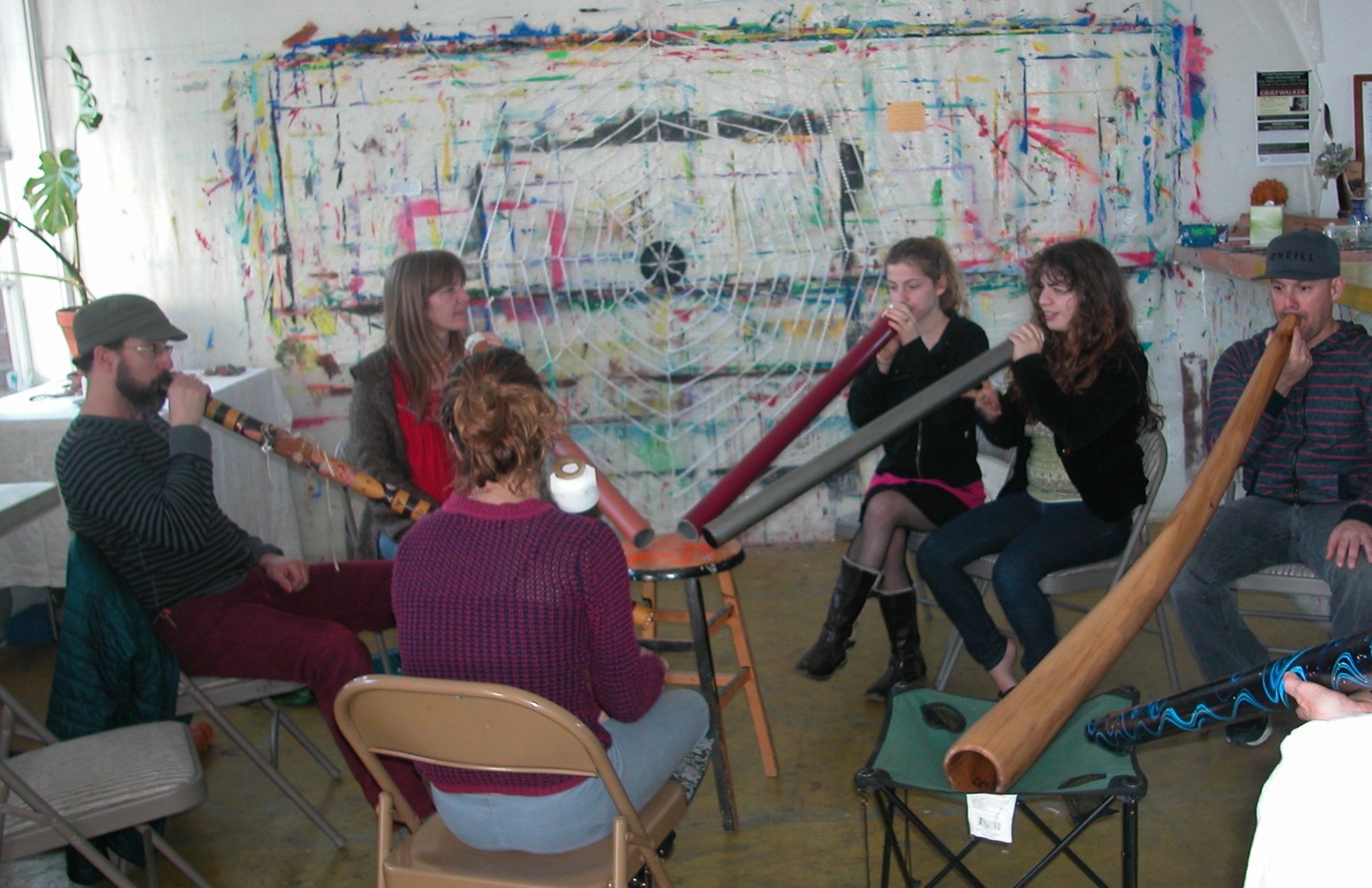Playing the Didgeridoo

How can you learn to play the didgeridoo?
Elise Peeples has been playing the didgeridoo for years and offers one-on-one sessions and classes to teach the skills to others.
The sound is not too difficult to make and can usually be learned in the first lesson. Circuar breathing which is the way to keep the sound going while you breath, takes more time and has been accomplished in a six-week series though it might take longer. It depends on how willing you are to practice. I have found that series classes are the best way to master circular breathing unless you are willing to take 6-10 weeks of private lessons.
I give lessons for $35.00/hour. This includes a starter didgeridoo.
Classes are available in series throughout the year. If you want to be on a waiting list for a series class, please e-mail me at info@SoundRivers.net.
Reasons to play didgeridoo
1.) To alleviate symptoms of sleep apnea and snoring
2.) Links Westerners with the ancient Aboriginal culture of Australia
3.) Helps with meditation
4). Teaches you to breath in a more healthy way
5.) Provides insight into yourself. and gives you a way to express yourself musically.
Alleviate Symptoms of Sleep Apnea
Reuters News Service recently reported that a study published by the British Medical Journal (2/4/06) shows that regular didgeridoo playing reduces snoring and daytime sleepiness. Snoring and obstructive sleep apnea syndrome are common sleep disorders caused by the collapse of the upper airways.
Reports of didgeridoo players experiencing reduced daytime sleepiness and snoring after practicing led experts in Switzerland to test the theory that training of the upper airways by didgeridoo playing can improve these disorders. They identified 25 patients with moderate obstructive sleep apnea syndrome and who complained about snoring. Patients were randomly allocated to an intervention group (didgeridoo lessons and daily practice at home for four months) or a control group (remained on a waiting list for lessons). Compared with the control group, daytime sleepiness and apnea scores improved significantly in the didgeridoo group. Partners of patients in the didgeridoo group also reported much less sleep disturbance.
The authors conclude that regular training of the upper airways by didgeridoo playing reduces daytime sleepiness and snoring in people with moderate obstructive sleep apnea syndrome and also improves the sleep quality of partners.
Links Westerners to indigenous cultures
Playing the didgeridoo reminds us of our earthly, indigenous roots. Originally these instruments were played to develop empathy with animals as the sounds of animals, birds and insects can be replicated on the didgeridoo. The didgeridoo seems to bring up energy from the earth itself and make it audible to the human ear.
Meditation
Playing the didgeridoo can enhance entry into a meditate state. Dirk Schellberg in Didgeridoo: Ritual Origins and Playing Techniques, quotes a psychotherapist who has been using the didgeridoo in his practice for years, Dr. Wolfgang Strobe,, “After lengthy practice of meditation it is common to experience inner tangible or audible vibrations (the yoga philosopher Patanjali calls this the ‘humming of the cosmic engine.’) These vibrations can be compared to the vibrations of the didgeridoo which can be perceived with the senses. What is heard after a while with the inner ear when a person meditates, can be made audible for the outer ear by the didgeridoo. (p. 73)
Breathing
Breathing is connected to the word “spirit” in many languages, including English. And yet so many of us have not learned to breath properly, causing physical as well as spiritual problems. The art of circular breathing that is needed to play the didgeridoo allows us to become conscious of our breathing and to correct problematic patterns that we have established. This special kind of breathing can be of help to anyone with pulmonary problems such as asthma.
The Greeks saw the diaphragm as the seat of the soul, using the same word for spirit, soul and diaphragm. Didgeridoo playing is an effective way to train the diaphragm because some of the rhythms are created directly by the diaphragm. Watch an experienced player, and notice the intense activity of the diaphragm.
Insight and expression
Didgeridoos have been used to reach a relaxed, dream-like state in which the unconscious can be accessed and insights gained. And it gives you all of the benefits of expressing yourself musically.
